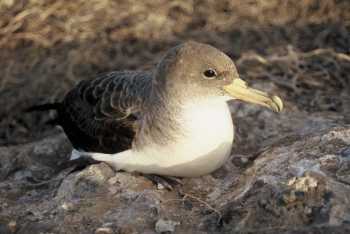Isabel Afán (Estación Biológica de Doñana, Sevilla, Spain) and colleagues have published in the journal Marine Biology on differences in the foraging areas of sympatric Cory’s Calonectris borealis and Scopoli’s C. diomedea Shearwaters during chick-rearing in the Mediterranean’s Chafarinas Archipelago.
The paper’s abstract follows:
“As central-place foragers, pelagic seabirds are constrained by spatiotemporal heterogeneity to find productive marine areas and compete for prey. We analysed 97 foraging trips to study the movement and oceanographic characteristics of foraging habitats of two different—yet closely related—species of shearwaters (Scopoli’s shearwater Calonectris diomedea and Cory’s shearwater C. borealis) breeding in sympatry in the Mediterranean. We combined various methodological approaches (GPS-tracking, species distribution modelling and stable isotope analysis) to explore the foraging strategies of these two species. Isotopic results suggested that trophic habits of both shearwater species were similar, mainly based on pelagic fish consumption. Foraging areas of both species were characterized by shallow waters near the colony. Both shearwater species exploited persistent productive marine areas. The foraging areas of the two species broadly overlapped during the incubation period, but during chick-rearing period, Scopoli’s shearwaters apparently foraged in different areas than Cory’s shearwaters.”

Cory's Shearwater, photograph by Paulo Catry
Reference:
Afán, I., Navarro, J., Cardador, L., Ramírez, F., Kato, A., Rodríguez, B., Ropert-Coudert, Y. & Forero, M.G. 2013. Foraging movements and habitat niche of two closely related seabirds breeding in sympatry. Marine Biology DOI 10.1007/s00227-013-2368-4.
John Cooper, ACAP Information Officer, 24 January 2013

 English
English  Français
Français  Español
Español